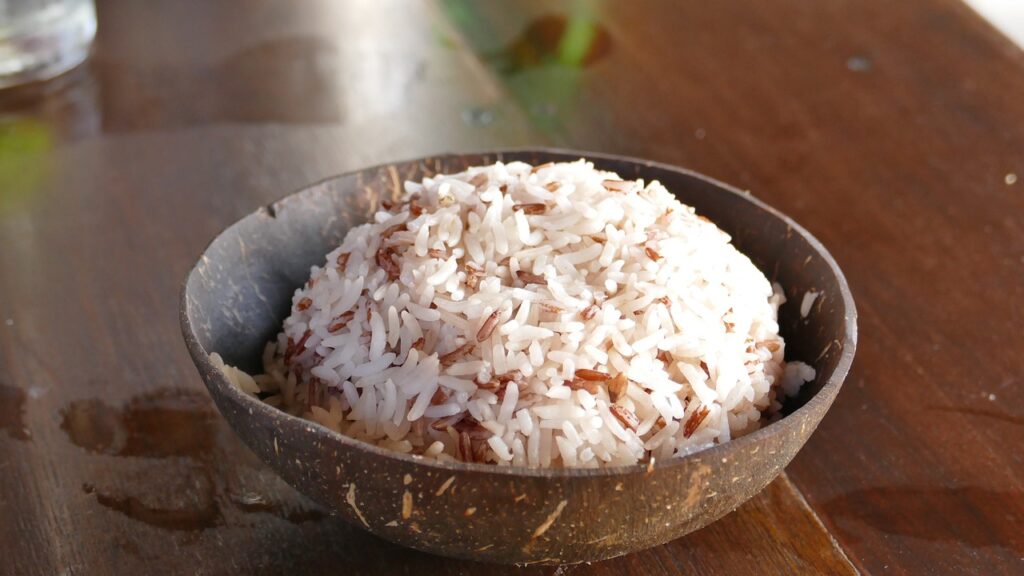Curious if dogs can eat coconut rice? Coconut rice, a delicious and aromatic dish, is enjoyed by many humans, but is it safe for our furry friends? Understanding the potential benefits and risks of feeding coconut rice to dogs is essential for any pet owner.
In this article, we’ll explore whether coconut rice is a healthy addition to your dog’s diet and what you need to consider before sharing this treat with your canine companion.
Coconut and Its Derivatives: What Dog Owners Should Know
Coconut, in its various forms, has become a popular ingredient in human diets. But what about our canine companions? Here’s a deeper dive into coconut and its derivatives, and how they can impact your dog’s health.
Coconut Milk for Dogs:
Coconut milk, derived from the flesh of the coconut, is a creamy liquid rich in nutrients. While it’s a delicious addition to many dishes, dog owners might wonder if it’s safe for their pets. In moderation, coconut milk can be a nutritious treat for dogs. It contains lauric acid, which has anti-inflammatory properties and can help combat harmful bacteria.
However, due to its high-fat content, excessive consumption can lead to weight gain or upset stomach in dogs. If you’re considering introducing coconut milk to your dog’s diet, start with small amounts and monitor for any adverse reactions.
Coconut Water for Dogs:
Coconut water is the clear liquid found inside young coconuts. It’s packed with electrolytes, making it a hydrating drink for humans. But is it suitable for dogs? In small quantities, coconut water can be a refreshing treat for dogs, especially on hot days. It’s low in calories and contains potassium, which is beneficial for muscle function.
However, it’s essential to ensure the coconut water is free from added sugars or flavorings, which can be harmful to dogs. As always, moderation is key.
General Benefits of Coconut for Dogs:
Beyond just coconut milk and water, the coconut itself offers several health benefits for dogs. The oil derived from coconut can be applied topically to soothe skin irritations or given orally to boost digestive health. The medium-chain triglycerides in coconut can aid in digestion and improve brain energy metabolism, beneficial for older dogs.
Furthermore, coconut’s anti-inflammatory properties can help reduce joint pain in arthritic dogs. If you’re considering adding coconut or its derivatives to your dog’s diet, always consult with a veterinarian to ensure it’s done safely and beneficially.
Key Takeaways: Coconut Rice for Dogs
- Safety: Coconut rice, when prepared without additives or seasonings, is generally safe for dogs in moderation.
- Nutritional Benefits: Coconut contains lauric acid, which has anti-inflammatory properties and can help combat harmful bacteria. Rice provides essential carbohydrates, aiding in energy production.
- Moderation is Key: While coconut rice can be a nutritious treat, excessive consumption can lead to weight gain or digestive issues in dogs.
- Avoid Additives: Ensure that the coconut rice given to dogs is free from added sugars, salts, or other potentially harmful ingredients.
- Consultation: Always consult with a veterinarian before introducing new foods to your dog’s diet to ensure safety and appropriateness.
What Exactly is Coconut Rice?
For those unfamiliar, coconut rice is a delightful dish made by cooking rice in coconut milk. This gives the rice a creamy texture and a sweet, tropical flavor. It’s loved by many around the world. But, is it loveable for our dogs?
Can Dogs Eat Coconut Rice?
Yes, dogs can enjoy coconut rice! It’s a tasty treat that combines the goodness of rice and coconut. Rice is easy for dogs to digest and can be soothing for their tummies, while coconut has nutrients that are good for their skin and fur.
But remember, it’s best to give coconut rice in small amounts and make sure it’s plain, without any added sugars or spices. Just like with any new food, it’s a good idea to watch your dog after they try it to make sure they feel okay. And if you’re ever unsure, asking your vet is always a smart move.
The Verdict on Coconut Rice
If you’re considering giving your dog coconut rice, keep a few things in mind:
- No Added Sugar or Salt: Often, coconut rice recipes may have extra ingredients. Always ensure it’s plain if you’re sharing with your pup.
- Moderation is Key: Just like with any treat, don’t give them a huge bowl. A small taste is enough.
- Keep an Eye Out: As with introducing any new food, observe your dog after they eat it. We want wagging tails, not upset bellies!
Why Your Dog Might Love It
- Texture Fun: The creamy texture of coconut rice can be a new experience for your dog. It’s different from their regular kibble!
- Taste Adventure: With the mild sweetness of coconut, it can be a refreshing change for them.
Related Foods and Their Safety for Dogs
While coconut rice is a topic of interest, it’s also beneficial for dog owners to understand the safety of related foods. This broader perspective can help them make informed decisions about their dog’s diet.
Plain Rice for Dogs:
Rice is a staple in many diets around the world and is often recommended for dogs with digestive issues. Plain, cooked rice, especially white rice, is easy for dogs to digest and is usually safe for most dogs.
It can be a good dietary addition, especially when a dog has an upset stomach. However, it’s essential to ensure the rice is cooked without any additives, salts, or seasonings that could be harmful to dogs.
Bananas for Dogs:
Bananas are a nutritious fruit packed with vitamins and minerals, such as potassium and vitamin C. They can be a healthy treat for dogs when given in moderation.
However, the banana peel isn’t easily digestible and can pose a choking hazard, so it’s best to remove it before offering a banana slice to your dog. As with all treats, moderation is crucial to prevent excessive calorie intake.
Alternative Ways to Introduce Coconut to Your Dog
If you’re intrigued by the benefits of coconut but not entirely sold on coconut rice, there are other ways to let your dog enjoy it:
- Coconut Oil: This can be added to your dog’s food or used externally to improve their skin and coat. Start with a small amount, as some dogs might have sensitive stomachs.
- Coconut Water: It’s a refreshing treat, especially in hot weather. However, ensure it’s pure coconut water without added sugars or flavors.
- Dried Coconut: These can be given as occasional treats. Always opt for unsweetened varieties and avoid those with added preservatives.
By exploring these options, you can find the perfect coconut treat that your dog not only enjoys but also benefits from.
If you found this info helpful and want a deeper dive into the world of dogs and coconuts, don’t forget to check our main post on Can Dogs Eat Coconut? It’s packed with more paw-some details!
Coconut Rice Bear Dog Breed
The Coconut Rice Bear Dog isn’t actually a dog breed. It sounds like a mix of food and animal names! However, if you’re thinking of the “Bear” breeds, there are dogs like the Karelian Bear Dog or the Tibetan Mastiff that are known for their bear-like appearance.
And if you’re considering feeding them coconut rice, remember to give it in small amounts and make sure it’s plain without any added stuff. Always check with your vet before giving new foods to your pet.
Frequently Asked Questions (FAQs) About Coconut Rice and Dogs
1. Can dogs eat coconut rice every day?
No, it’s best to give coconut rice as an occasional treat. Eating it every day might be too much for some dogs and could upset their stomach.
2. Are there any side effects if my dog eats too much coconut rice?
Yes, if dogs eat too much coconut rice, they might get an upset stomach, diarrhea, or gain weight. Always give in moderation.
3. What’s the difference between coconut milk and coconut water? Which is better for dogs?
Coconut milk is creamy and comes from the coconut’s flesh, while coconut water is the clear liquid inside young coconuts. Both are safe for dogs in small amounts, but coconut milk has more fat, so it’s best to give it less often.
4. How much coconut rice can I give my dog?
It depends on your dog’s size. For small dogs, a spoonful is enough. Bigger dogs can have a bit more, but it’s always good to start with a small amount and see how your dog reacts.
5. Are there other foods I should avoid mixing with coconut rice for my dog?
Yes, avoid adding foods that are harmful to dogs, like chocolate, grapes, or onions. Always keep the coconut rice plain and free from added sugars or salts.
6. Why is coconut good for dogs?
Coconut has things called nutrients that can be good for a dog’s skin, coat, and digestion. It also helps fight off bad germs.
7. Can puppies eat coconut rice?
Yes, but only a tiny amount. Puppies have sensitive stomachs, so it’s best to be extra careful and always check with your vet first.
Conclusion: Coconut Rice and Your Dog
Coconut rice can be a tasty treat for your dog, but like all treats, it’s best given in moderation. While the coconut offers some health benefits, it’s essential to ensure the rice is plain without any added sugars, salts, or harmful ingredients.
Always keep an eye on your dog after introducing any new food to their diet to make sure they react well to it. And remember, when in doubt, it’s always a good idea to ask your vet for advice. They can provide guidance tailored to your dog’s specific needs, ensuring they stay happy and healthy.


